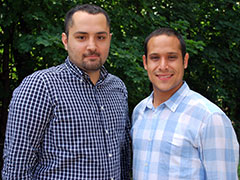Scholars Master National Award
By Eleni Kanavas
Four master's students at Sunnybrook Research Institute (SRI) are recipients of the 2012 Frederick Banting and Charles Best Canada Graduate Scholarships awarded by the Canadian Institutes of Health Research (CIHR). This year's winners are Joshua Bernick, Hamid Ebrahimi, Reuben Thomas and Weining Yang.
The prestigious scholarship provides graduate students in a health-related field with funding early in their academic studies. Each student will receive a one-year stipend worth $17,500. Across Canada, 184 graduate students received funding from CIHR in the spring competition.
"It's a great feeling to know that you're selected as one of the top students and that they think you have promise, drive and potential to succeed," said Bernick who works in the lab of senior scientist Dr. Cari Whyne, director of the Holland Musculoskeletal Research Program at SRI. "It makes you work a little bit harder because you have people beyond yourself that are counting on you and supporting you."
Bernick's research aims to evaluate the role of lithium as a fracture-healing agent by investigating how the variation of treatment parameters affects bone strength in preclinical models. His project is co-supervised by orthopaedic surgeon Dr. Diane Nam, an associate scientist in biological sciences at SRI.
Ebrahimi is co-supervised by Whyne and Dr. Albert Yee, an orthopaedic surgeon and associate scientist in the Holland Musculoskeletal Research Program at SRI. He will use the funds to design and evaluate a device to facilitate long bone fracture reduction. The potential for reducing operative times with this device may translate into both improved outcomes and reduced health care costs for fracture reconstruction of the thigh and shinbone.
As mechanical engineers working in SRI's orthopaedic biomechanics laboratory, Bernick and Ebrahimi are also classmates in the Institute of Biomaterials and Biomedical Engineering at the University of Toronto. Both students said they found an interest in health-related aspects of engineering because the nature of the work allows them to design tools that have potential for clinical translation.
"I came from a 3-D modeling background, and I have a good understanding of the mechanical properties and mechanical behaviour of the tool," said Ebrahimi. "I come up with a concept design and show it to Dr. Whyne and Dr. Yee, and we make sure that it's a robust design on the engineering side and a practical device for use in the operating room, and then I make a prototype to see if it actually works or not."
Yang, who is supervised by Yee, will begin his graduate studies in September 2012 at the Institute of Medical Science at U of T. His research will focus on the role of microRNAs (small ribonucleic acid molecules that regulate gene expression) in breast cancer. He is developing molecules called miR-GLUE in an attempt to counteract the effects of microRNA in the disease by examining cell survival, self-renewal and tumour formation.
Thomas is in his second year of studies in the Laboratory Medicine and Pathology department at U of T. He says his interest in heart health began in his final year of undergraduate studies when he took a course in cardiac pathobiology. Supervised by Dr. Bradley Strauss, chief of the Schulich Heart Centre at Sunnybrook and senior scientist in biological sciences at SRI, Thomas is studying the impact of distal embolization (small blood clots) on microvascular injury in heart attacks using magnetic resonance imaging techniques to visualize the heart. The project aims to understand heart function better by creating a preclinical model to develop a treatment that will restore blood flow to small vessels.
For students looking for funding opportunities, Thomas and Yang stress the importance of gaining as much research experience as possible at the undergraduate and graduate levels and applying to various agencies. "The funding climate is tight," Yang said, "and it's important for students to do their part to support their own research."





